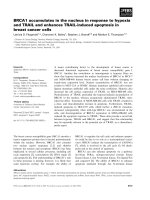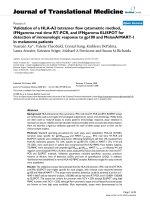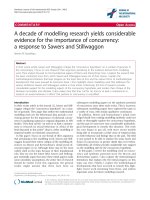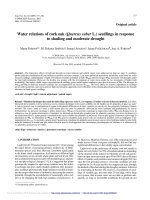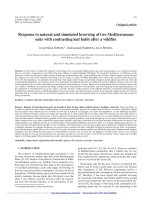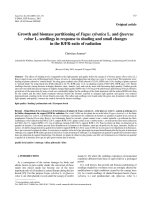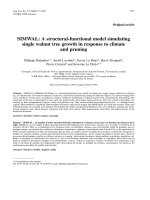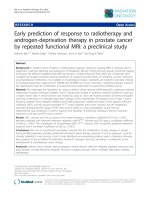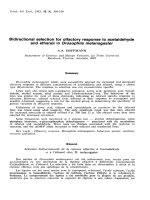Response to throop and murphy (Pierre Bourdieu)
Bạn đang xem bản rút gọn của tài liệu. Xem và tải ngay bản đầy đủ của tài liệu tại đây (45.23 KB, 2 trang )
Anthropological Theory
Response to Throop and Murphy
Pierre Bourdieu
Anthropological Theory 2002; 2; 209
DOI: 10.1177/14634990222228998
The online version of this article can be found at:
Published by:
Additional services and information for Anthropological Theory can be found at:
Email Alerts: />Subscriptions: />Reprints: />Permissions: />
Downloaded from at SAN FRANCISCO STATE UNIV on February 19, 2008
© 2002 SAGE Publications. All rights reserved. Not for commercial use or unauthorized distribution.
05 Bourdieu (JB/D)
30/4/02
10:15 am
Page 209
Anthropological Theory
Copyright © 2002 SAGE Publications
(London, Thousand Oaks, CA
and New Delhi)
Vol 2(2): 209
[1463-4996(200206)2:2;209;024463]
Response to Throop
and Murphy
Pierre Bourdieu
Collège de France
Editor’s Note. This response was written by Pierre Bourdieu at the end of 2001, shortly
before he passed away in January 2002.
While thanking the authors for their very serious and thorough work, I would like to
raise some questions as to their intentions themselves. I see in fact a contradiction in
reproaching me at once (1) for failing to do justice to phenomenology, to which it would
seem I am more beholden than I am willing to acknowledge (p. 197: ‘Here, as elsewhere,
Bourdieu seems to be merely rephrasing some of Schultz’s premises in his own
idiosyncratic and overly deterministic vocabulary so as to make them sound new, when in
reality they are not’; or p. 203: ‘[Pierre Bourdieu] fails to acknowledge the positive
influence that Husserl’s thinking has had upon his own theoretical formulations’), and
(2) for having misunderstood, misinterpreted and misconstrued the ideas of Husserl and
the phenomenologists (e.g. p. 198: ‘his very phenomenological naivety that has led him
to mistakenly characterize all non-representational states as necessarily “non-conscious”
. . .’ or p. 203: ‘he often mischaracterizes Husserl’s ideas’).
In short, it is not possible to claim, without serious inconsistencies, that what I say
about Husserl is true and therefore that I am a quasi-plagiarist dissimulating his borrowings (whereas I have often declared my indebtedness to phenomenology, which I
practiced for some time in my youth), and that what I say about Husserl is false and
that my criticisms or reservations are unfair.
It seems to me that I do indeed do justice to Husserl, Schutz and a few more. But it was
not my intention either to rephrase them in one of those commentaries which, to sound
like Mallarmé, ‘forms a pleonasm’ with the work, nor to refute them. It is my aim to
integrate phenomenological analysis into a global approach of which it is one phase (the
first, subjective phase), the second being the objectivist analysis. This integration is in
no way an eclectic compilation since the effect is to pass beyond the limits (which I recall
in my critique) inherent in each approach, while retaining their essential contributions.
But I think that the misreading of my ideas is rooted in the fact that the authors forget
that, in my intent, the theoretical ideas which they treat in isolation, separately, in and
for themselves, are designed to guide empirical research and to solve specific problems
of anthropology and sociology . . . such as the problem of gift-exchange or that of work,
for which I proposed, in Pascalian Meditations, an analysis integrating the subjectivist
and objectivist views, as well as many others over the course of my research career.
209
Downloaded from at SAN FRANCISCO STATE UNIV on February 19, 2008
© 2002 SAGE Publications. All rights reserved. Not for commercial use or unauthorized distribution.
